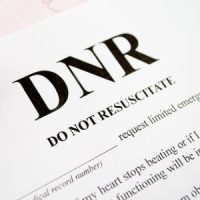All About ‘Do Not Resuscitate Orders”

End-of-life planning may not be the most pleasant or exciting activity, but it is one that is necessary for everyone. When thinking about potential situations that you may be in, especially if you become ill or incapacitated, you should consider what medical treatment you’d like to have and what you would refuse. You can indicate in your end-of-life planning documentation, your medical decisions and the way that you want to be treated if you are unable to speak for yourself and tell a medical provider what your wishes are.
One of the documents you may decide to prepare is a Do Not Resuscitate Order (DNR). This document explains your desire to allow natural death to take place in certain circumstances.
There is plenty to think about when you are end-of-life planning. Making sure that you have your wishes laid out clearly so that medical providers and your healthcare proxy know exactly what to do is essential. Getting these documents right is a must considering that documentation such as a DNR would be used when you are in a position where you are no longer able to advocate for yourself and express your personal medical decisions.
For assistance with your end-of-life plans, please consider connecting with a Canton advanced directive attorney at the Law Office of Brian S. Karpe.
Including a DNR in Your End-of-Life Planning Documentation
The future is never guaranteed, and you could face very serious decision-making depending on the medical situation you find yourself in. For some of these, your personal resolution could be to allow natural death. If this happens and you are also unable to speak and communicate, then if you have a DNR in place, this will inform the medical staff that you are refusing CPR and any other type of life-support measures. In other words, you do not want the medical staff to intervene when your heartbeat or your breathing stops.
Keeping a DNR in your medical file is advantageous. This is because despite having a living will that could indicate specific circumstances where you would not want resuscitation, having your DNR available could help the staff in an emergency situation where quick action is vital. In the hospital, having a DNR posted will alert the staff of your wishes and lessen the chances of confusion.
Should you have a medical crisis outside of a hospital, then an out-of-hospital DNR will tell any first-responder that you do not want to be revived.
Having a DNR in your end-of-life planning documents is not mandatory. It is only necessary if there are instances that you would not like medical staff or first responders to make every attempt to save your life.
Speak to a Connecticut Advanced Directive Attorney Today
When you put a comprehensive end-of-life plan in place, you can take much of the burdens and responsibilities off of your loved ones when it comes to having to make critical and emotional decisions about your welfare.
Please call our Connecticut advanced directive attorney at the Law Office of Brian S. Karpe at 860-217-1458 if you would like assistance putting together an advanced directive.
